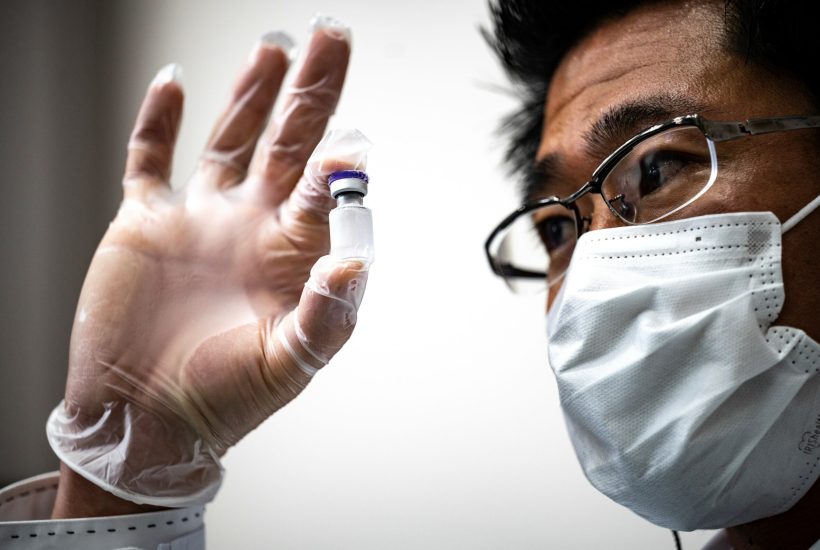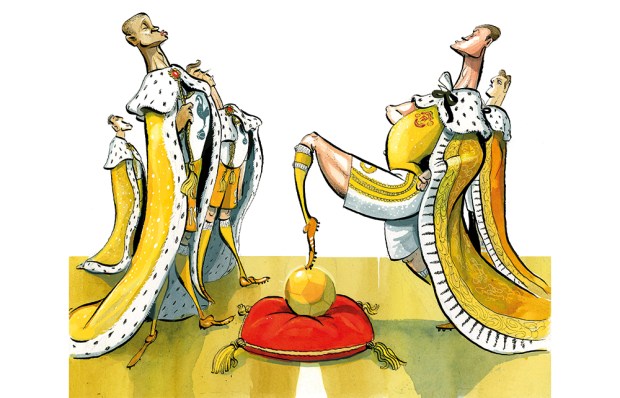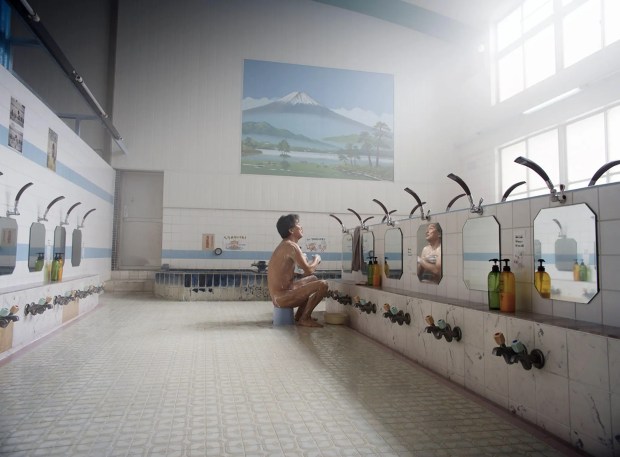Japan finally began its Covid-19 vaccination programme this week after a consignment of 60,000 vials arrived by charter flight from Europe. Medical staff will be first in line to be jabbed, followed by Japan’s innumerable seniors (presumably starting with the super-centenarians), then those with pre-existing conditions, and finally the general population. A rapid and successful roll out is seen as a last chance to save the summer Olympics and with it, probably, the government of Prime Minister Yoshihide Suga. But a whole host of problems is making that outcome look decidedly optimistic.
Firstly, there’s a shortage of syringes capable of extracting the full six shots from each vial: the standard syringes the Japanese government ordered can only draw out five, leaving a dribble of precious fluid behind. In the land where mottai nai (regret over waste) is an article of faith, and given that Japan’s contract with Pfizer guarantees doses for 72 million people (from a population of 126 million), this is a serious shortcoming. An effort has been mounted to ramp up production of six-shot syringes in Japan and Thailand, but it could take months.
Japan is almost entirely reliant on overseas suppliers for vaccines and related equipment, having wound down its own production capacity over the last 50 years. Japanese pharmaceutical companies have been reluctant to maintain investment in a business usually focused on children, particularly given the country’s declining birth rate, and are consequently unprepared. A few domestic companies such as Shionogi and Daiichi Sankyo have been working on original vaccines but a market ready product is a distant speck on the horizon. And even when they do arrive, there is a lengthy and complicated approval process to negotiate.
Even if the supply issues could be resolved and administration streamlined, there is a level of vaccine scepticism in Japan that could hinder a mass inoculation programme. Market research firm Ipsos MORI surveyed 15 countries in late January and Japan came near the bottom in terms of vaccine enthusiasm, with only 19 per cent describing themselves as keen. An Asahi Shimbun survey from January, asking respondents what they would do if a free vaccine became available, found 70 per cent preferring to wait until it was proved safe, and 8 per cent declaring they would refuse to take it at all. Potential side effects were cited as the prime reason for the hesitancy.
To a degree, this caution is understandable, as Japan has experienced a series of vaccine scandals in the recent past. In 2013 the health ministry withdrew a vaccine against the human papillomavirus after reports of people being left with lasting pain; in 2011 four children given vaccines against types of meningitis and pneumonia died, leading to the immediate suspension of the programme; and in 1993 the MMR (measles, mumps, rubella) vaccine was withdrawn over fears that it caused meningitis. Multiple lawsuits ensued from these cases generating intense public interest.
There has been particular disquiet over the speed at which the Covid-19 vaccine has been produced, and the original process used to develop it. Concern has also been raised that most of the overseas clinical trial subjects were Caucasians, with very few Asians involved. It should be noted that prior immunity acquired from exposure to earlier coronaviruses is a possible reason for the lower death rate in Asia, so it is not difficult for people here to believe that if reactions to the virus may vary depending on ethnicity, so may reactions to the vaccine.
Prejudice may be a small part of it, though, as scepticism against any new ideas related to health, especially those imposed from elsewhere, and a preference for long established practices and faith in traditional beliefs lingers on. This tendency is characterised by the endurance of various old wives’ tales, such as the idea that blood type determines character, or that women cannot be good sushi chefs as their (mythical) higher body temperature affects the flavour of the rice, or (my least favourite): that you should stop eating when 80 per cent full. There maybe something in that last one, but I still don’t like it.
Innate suspicion of large-scale government initiatives of any sort is deeply ingrained here too, especially those that threaten societal harmony. Much has been made of the American imposed constitution being the reason restrictions on personal liberty have been mild here. But ways of circumventing the constitution are possible, have been discussed, and indeed implemented, but only to a very limited degree. Anything more radical would have gone against the grain and caused trouble.
A campaign for the country to roll up its sleeves will no doubt be launched soon. But if the idea takes hold that vaccine urgency is motivated as much by the Olympics and the careers of politicians, as it is by concern for people’s welfare, then getting the Japanese fully on board for a high-speed mass vaccination programme, even if the practical obstacles can be overcome, will be a considerable challenge.
Got something to add? Join the discussion and comment below.
Get 10 issues for just $10
Subscribe to The Spectator Australia today for the next 10 magazine issues, plus full online access, for just $10.




















Comments
Don't miss out
Join the conversation with other Spectator Australia readers. Subscribe to leave a comment.
SUBSCRIBEAlready a subscriber? Log in